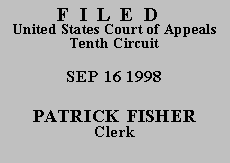

| GEORGE L. SMITH,
v.
STEVE HARGETT |
|
Before SEYMOUR, BRORBY, and BRISCOE, Circuit Judges.
After examining the briefs and appellate record, this panel has determined unanimously that oral argument would not materially assist the determination of this appeal. See Fed. R. App. P. 34(a); 10th Cir. R. 34.1.9. The case is therefore ordered submitted without oral argument.
Mr. Smith is a state prisoner who filed a petition for habeas relief in the district court. The district court denied his petition and, acting pro se, Mr. Smith appeals.
A jury convicted Mr. Smith of first degree murder and he was sentenced to life imprisonment. After his conviction and sentence were affirmed on direct appeal in state court, Mr. Smith filed a petition for Writ of Habeas Corpus pursuant to 28 U.S.C. § 2254. In his § 2254 petition, Mr. Smith alleged seven constitutional errors: (1) the trial court erred in denying a continuance, which denied him his Sixth Amendment right to effective assistance of counsel; (2) the trial court erred in denying Mr. Smith's motion in limine on use of his prior convictions and erred in denying admission of evidence of the victim's prior drug convictions; (3) the trial court denied his right to a fair trial when he was labeled a "drug user" during jury selection and when a black juror was removed from the panel; (4) the trial court erred in admitting photographs of the victim and allowing exhibits in the jury room; (5) the trial court denied his right to confront witnesses by the trial court's limitation on cross-examination of a witness; (6) the trial court erred in allowing a jury instruction that indicated a statement made by Mr. Smith was a "confession" rather than an "admission"; and (7) the trial court erred in instructing the jury regarding the maximum punishment for the lesser included offense of first degree manslaughter.
The petition for habeas relief was referred to a magistrate judge. The magistrate judge reviewed Mr. Smith's claims and issued an eighteen-page Report and Recommendation. In it, the magistrate judge concluded Mr. Smith was not entitled to relief. A copy of this Report and Recommendation, dated August 18, 1997, is attached hereto and made a part hereof.
Mr. Smith objected to the magistrate judge's conclusions. The district court reviewed his case and concluded the "facts and law are fairly and completely stated in the Report and Recommendation of the Magistrate Judge." Furthermore, the district court noted, "Petitioner raises no matter of fact or law that was not clearly and accurately addressed." The district court thereupon adopted the Report and Recommendation in its entirety and overruled all objections raised by Mr. Smith.
Mr. Smith appeals that decision. He asserts: (1) the district court erred in adopting the magistrate judge's report and recommendation because it was based on an unreasonable determination of the facts in light of the evidence presented in the state court proceedings; (2) the district court erred in its decision on the trial court's rejection of his motion for a continuance; (3) the district court erred in its decision on the photographs of the deceased's injuries; (4) the district court erred in its decision on Mr. Smith's right to confront witnesses in trial; (5) the district court erred in its decision on the instruction of confession versus a instruction of admission; and (6) the district court erred in decision on the trial court's lack of guidance during the sentencing. In other words, he simply reiterates the points he raised before the district court and the magistrate judge.
As a threshold matter, we must first decide whether Mr. Smith is entitled to proceed in forma pauperis. The district court denied Mr. Smith's application to proceed without paying the appeal fee, finding Mr. Smith "has not presented a reasoned, nonfrivolous argument on appeal and that the appeal is not taken in good faith." Pursuant to Federal Rule of Appellate Procedure 24(a), Mr. Smith now asks this court to grant him leave to file his appeal in forma pauperis.
"In the absence of some evident improper motive, the applicant's good faith is established by the presentation of any issue that is not plainly frivolous." Ellis v. United States, 356 U.S. 674 (1958). Giving Mr. Smith the benefit of the doubt as a pro se litigant, we believe his appeal barely meets this standard. Therefore, we will consider his appeal. Mr. Smith is responsible for any obligations this may create under 28 U.S.C. § 1915(b).
The district court also denied Mr. Smith a certificate of appealability, which he must obtain to appeal the denial of his § 2254 petition. See 28 U.S.C. § 2253(c)(1). Mr. Smith may only obtain a certificate of appealability if he makes a showing of the "denial of a constitutional right." 28 U.S.C. § 2253(c)(2).
We agree with the district court that Mr. Smith has failed to make the required showing. We can explain the law no more clearly and no more accurately than was explained in the thorough and accurate analysis by the magistrate judge in the attached Report and Recommendation. Mr. Smith has failed to persuade this court of any error in either the facts or the law as both were set forth by the magistrate judge. Were we to grant the certificate and reach this appeal on the merits, we would have no problem in affirming the judgment of the district court for substantially the same reasons set forth by the magistrate judge.
The request for a certificate of appealability is denied, and the appeal is DISMISSED.
Entered by the Court:
WADE BRORBY
United States Circuit Judge
*. This order and judgment is not binding precedent except under the doctrines of law of the case, res judicata and collateral estoppel. The court generally disfavors the citation of orders and judgments; nevertheless, an order and judgment may be cited under the terms and conditions of 10th Cir. R. 36.3.